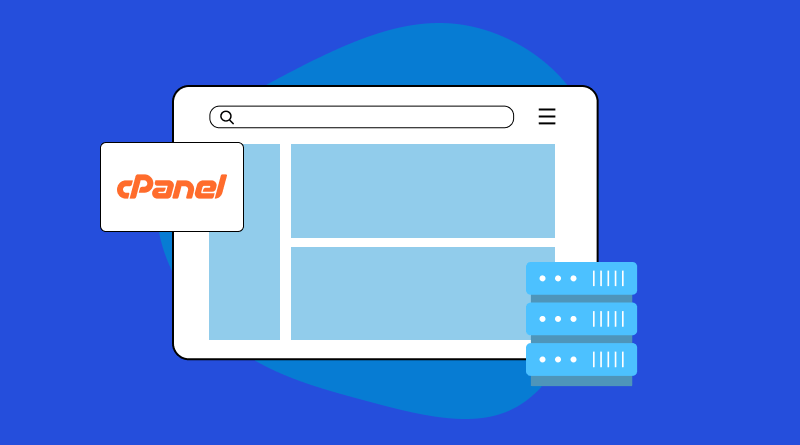cPanel is the popular control panel compatible with different Linux distros on VPS servers like Ubuntu VPS, Fedora, AlmaLinux VPS and others. Not just VPS, but shared hosting, dedicated hosting or others have cPanel configured in it. However, not all web hosting account admins are comfortable with this control panel.
So, are you finding challenges in the nitty-gritty of the cPanel? Here are the cPanel alternatives to manage everything. Right from website to email accounts and server resources, all will be handled through these best cPanel alternatives. Let’s figure it out!
Table Of Content
What is cPanel?
cPanel is a widely used web hosting control panel worldwide. It is designed to simplify website and server management; it provides users with an intuitive graphical interface to handle several hosting tasks without requiring advanced technical knowledge.
The popularity and versatility of cPanel are eminent. Users can perform essential tasks like creating email accounts, managing databases, setting up FTP access, and monitoring website performance from a single interface.
Why Consider cPanel Alternatives?
Although 1 in 8 websites use cPanel as the web hosting control panel, price is the major factor that pushes web hosting account users to look for the cPanel alternative. Their pricing plan starts at $26.99 per month and goes upto $65.99 per month. But this was just one factor. Many others we have covered in the pointers below.
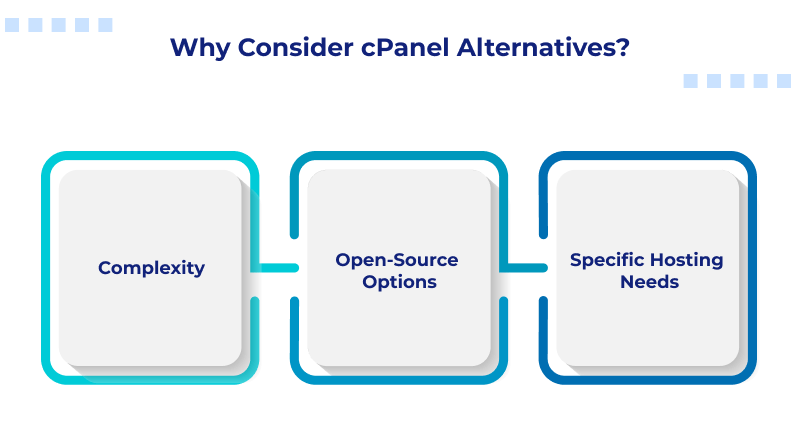
1. Complexity
cPanel can be overwhelming for beginners or those who prefer a more streamlined experience. Its extensive options, menus, and settings may be excessive for users who only need basic web hosting management. Thus, beginners who don’t want the clutter of advanced settings may prefer the cPanel alternative.
2. Open-Source Options
Many web hosting providers minimize their costs in plans with open-source control panels. They offer high flexibility, transparency, and savings. Also, users get extensive customization, enabling users to customize the software to their specific requirements. Additionally, these alternatives often have active community support, regular updates, and the ability to modify the code freely, which is particularly useful for developers and tech-savvy users.
3. Specific Hosting Needs
Not every environment for hosting is fully compatible with cPanel, in some cases, it might be essential to consider a secondary control panel. Users who prefer to use Nginx over Apache, need a robust platform for VPS hosting. Nginx users might also need some specific integrations with cloud-based infrastructures and may find that cPanel imposes restrictions.Some alternatives are optimized for particular server technologies or include features that better suit specialized applications, making them a more practical choice.
List of cPanel Alternatives
In this listing below, we have highlighted cPanel free alternatives and paid options. It will help you in making an informed decision, keeping the cost factor in mind.
1. Webuzo
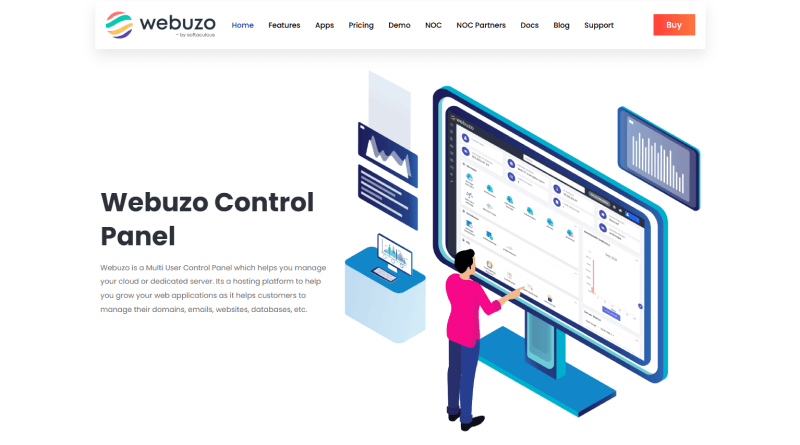
Webuzo is a lightweight control panel to simplify server management. Softaculous has developed it with the same think tank behind the 1-click app installer. It supports a wide range of applications, including WordPress, Joomla, Drupal, and 450 others. Users can easily manage or handle tasks like managing domains, setting up email accounts and monitoring server resources with its intuitive dashboard.
It is compatible with Linux and Windows operating systems and multiple web servers like Apache, Linux, and LiteSpeed. This makes it a versatile option for different hosting environments, whether you’re running a shared hosting service, a VPS, or a dedicated server.
2. Cyberpanel
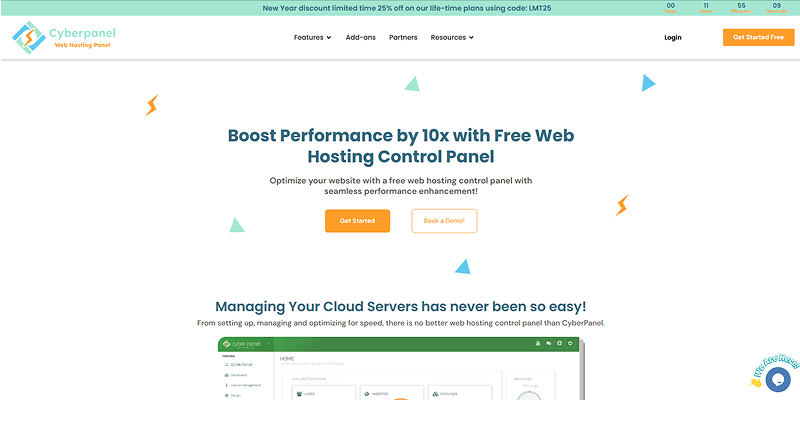
Cyberpanel is the next cPanel free alternative after Webuzo which is specifically designed for LiteSpeed web servers. Its open-source version is suitable for beginners with basic functionalities. They leverage DNS management, Docker integration, community support, and other features that are more than enough for users.
However, it also contains a premium version where 24×7 customer support is available. But on the free version also, you will get community support even for the high-traffic websites at no additional cost.
3. Webmin
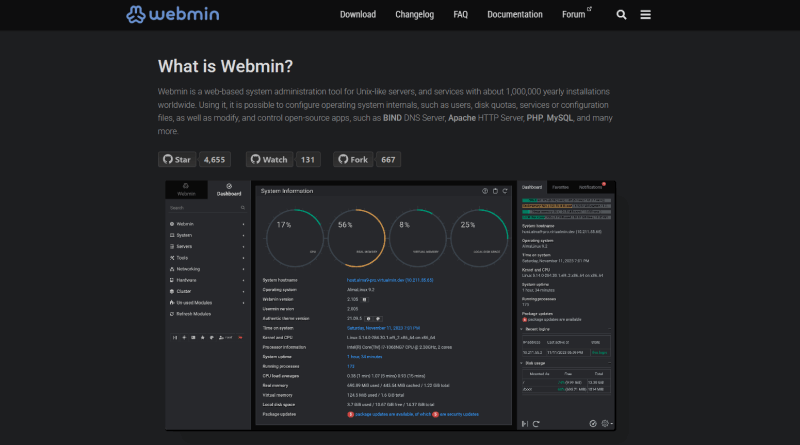
If you’re on a tight budget and want to save money, Webmin is a good cPanel alternative. This is an open-source web platform available for Unix that includes a great selection of hosting management tools. An attractive management interface makes all tools accessible. Everything is intuitive and easy to find despite being a little simple. Use the built-in tools to configure your website, or hire a developer to create custom tools.
There are a few downsides to using Webmin. It can take some time for security fixes to be developed for open-source projects. The only way to contact customer service is through forums and online chat sites, and it can be difficult to make advanced changes without a high level of technical expertise.
4. Plesk
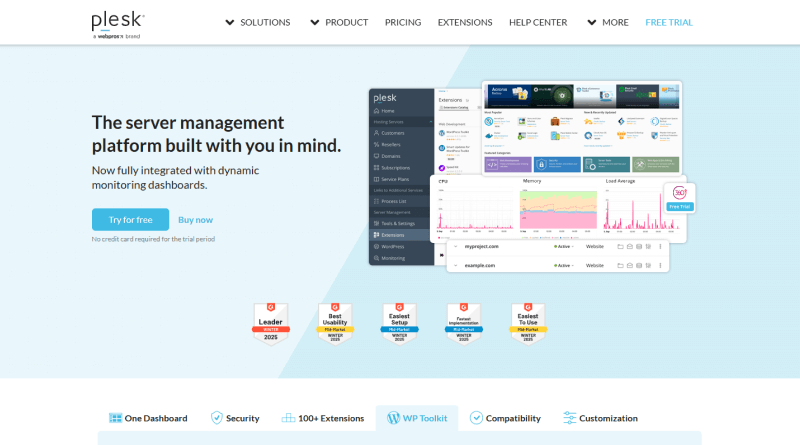
Plesk is the popular control that is included without Windows VPS hosting plans. If you are hosting web apps on Windows OS, then only this cPanel alternative will work for you. It is quite expensive and may not be suitable for beginners. But it stands out because of the live chat support, online ticket submission, and phone assistance.
Also, Plesk has strong security features like a built-in firewall, an intrusion detection system, and support for SSL certificates. It also offers support for WordPress, with a dedicated toolkit that simplifies WordPress installation, management, and updates.
5. DirectAdmin
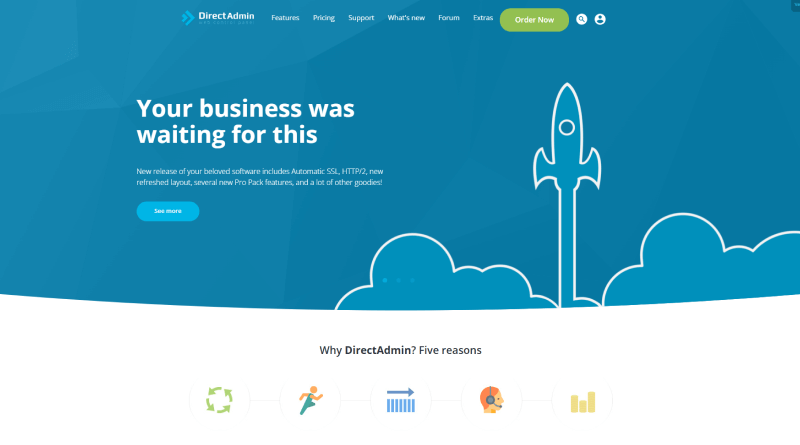
Do you want to boast advanced hosting management features at a competitive price? DirectAdmin is a go-to option that offers an excellent 60-day free trial. However, you have to pay the sign-up amount, so we can’t count it in the free cPanel alternative. It has a more intuitive control panel, which is streamlined.
Its user interface is among the best we’ve seen. It’s much more intuitive than cPanel’s and makes it easy to navigate. DirectAdmin’s main dashboard homepage contains hosting resource usage and database insights, along with the domain status. Other advanced tools streamline the configuration, like custom error pages, cron jobs, SSH keys, and other technicalities.
6. ISPConfig
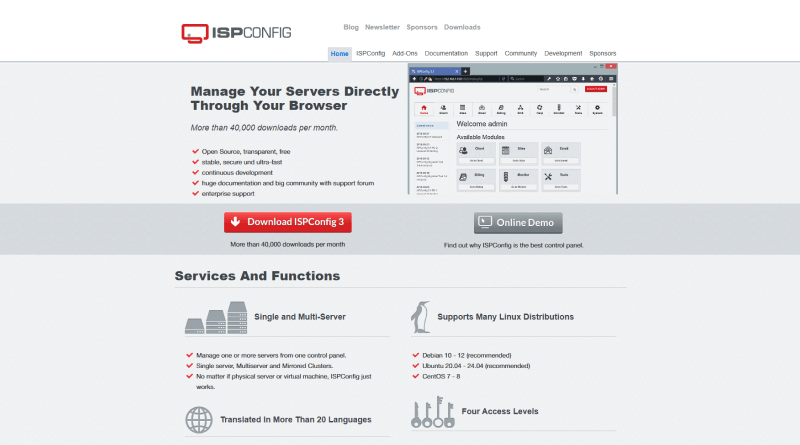
Consider ISPConfig as an open-source cPanel alternative in the market. It has a dashboard panel where you can choose Apache and Nginx web servers and manage them efficiently. You can set up virtualization, mirror configurations, and manage Domain Name System (DNS) servers using different tools.
Beyond multi-server management, ISPConfig offers a wide range of features comparable to commercial control panels. It supports various web servers (Apache, Nginx), databases (MySQL, MariaDB), and email services. It includes tools for DNS management, file management, backups, and monitoring. The open-source nature of ISPConfig means there are no licensing fees, making it a cost-effective solution.
7. Virtualmin
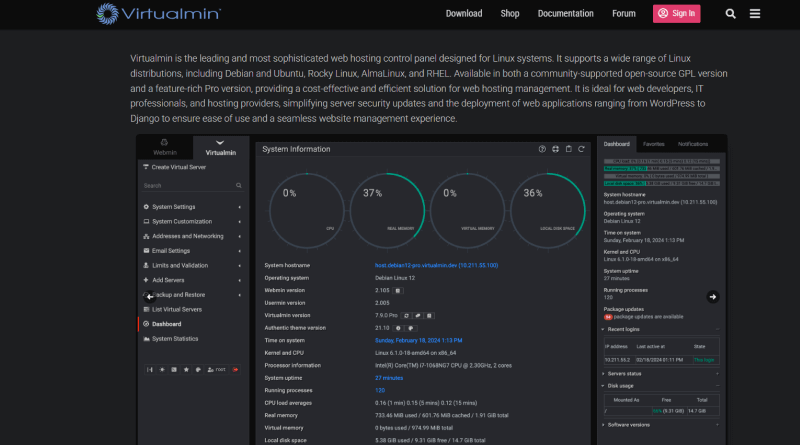
Virtualmin is a uniquely powerful and flexible web server administration tool. It is built on top of Webmin and published under the GPL. The dashboard looks simplified and clean and has the basic customization feature also to manage accounts.
Beyond its multi-virtual host management capabilities, Virtualmin inherits the extensive functionality of Webmin. This includes features like file management, system monitoring, software package management, and server configuration. It supports various web servers (Apache, Nginx), databases (MySQL, MariaDB, PostgreSQL), and email systems.
8. VestaCP
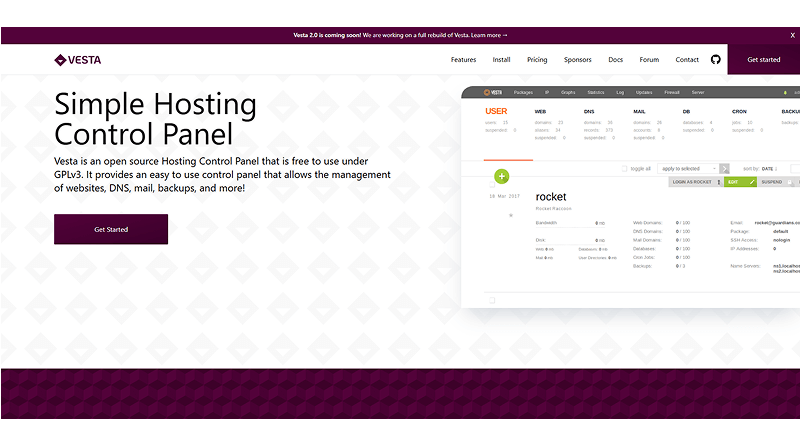
The main focus with VestaCP is on simplicity. It’s obvious as soon as you look at the website, and the theme runs through the control panel. The web interface is lightweight and runs on JavaScript and PHP. It doesn’t stand out from other cPanel alternatives, and there are no surprises. However, this isn’t the focus of the control panel. It’s fast and efficient.
In spite of this, VestaCP’s tools and functionality will feel familiar, which is a positive. APIs are available for Ubuntu, Debian, and CentOS distros, and MySQL or PostgreSQL can be used (with phpMyAdmin or phpPgAdmin, respectively). With all of these features, VestaCP makes a comfortable control panel right from the start.
9. InterWorx
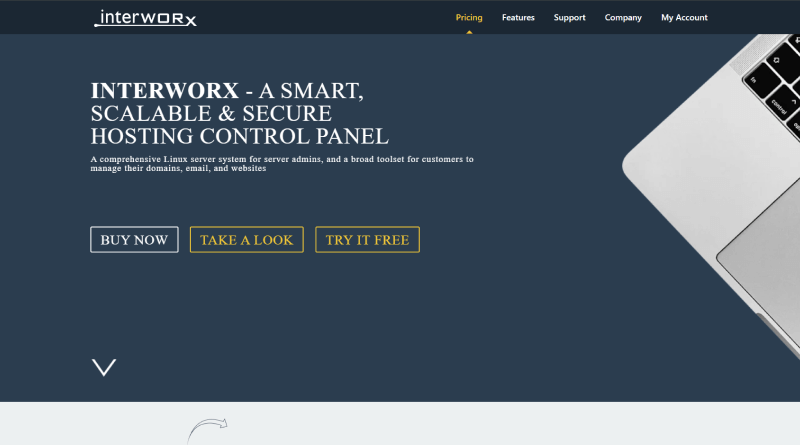
InterWorx comes with the full scope and scalability as a cPanel alternative. It contains different server control tools, such as firewall rules management, database management, virus protection and more. Both server- and client sides are covered. You can manage your servers with NodeWorx, that offers a comprehensive set of features. Additionally, there are many server control tools, such as firewall rules management, database management, virus protection, etc.
SiteWorx, on the other hand, offers a user control panel that allows you to manage domains, view statistics, install applications, and more. Both of these services are included in InterWorx. InterWorx is a cPanel alternative that allows multiple admin and user accounts and uses clustering technology.
10. aaPanel
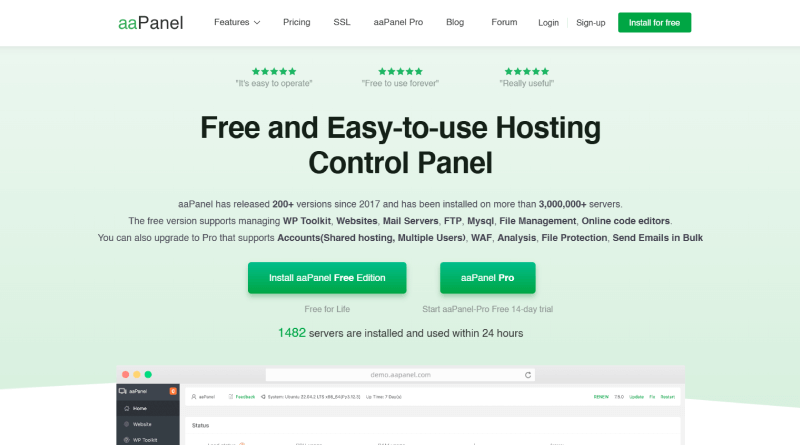
aaPanel is the popular cPanel alternative in Asia which deserves to find its way into western nations. It is another free and open-source option that includes lots of features which is great for a network of a few servers. The features are standard across the board, though there are lots of environments to choose from. You are not restricted to Apache and Nginx either, as OpenLiteSpeed is also supported.
In addition to MySQL support, MongoDB is also included for those interested in NoSQL solutions. A dedicated aaPanel plugin provides Java and Python project managers, PostgreSQL managers, DNS managers, and much more. Once activated, you can choose Amazon S3, Google Cloud, and other cloud storage options.
Key Features to Look for in a cPanel Alternative
Here is the list of essential features that you must consider in a cPanel alternative.
1. User-Friendly Interface
A user-friendly interface in the control panel is one of the critical features to consider. Whether you are a beginner or an experienced webmaster, an intuitive and easy-to-navigate dashboard can save time and reduce frustration. A well-designed interface should provide clear menus, straightforward settings, and quick access to essential tools like file management, domain settings, and email configurations.
Additionally, a modern interface with a responsive design ensures that the control panel is accessible from various devices, including desktops, tablets, and smartphones. This flexibility is especially important for users who need to manage their websites on the go. A clutter-free, visually appealing interface can significantly enhance the overall user experience, making it a key factor when choosing a cPanel alternative.
2. Multiple OS Compatibility
Compatibility with multiple operating systems like Windows, Linux, and others is a key factor to note. Linux-based systems are the common thing in web hosting operations, but some require the support of Windows servers. ASP.NET or other Windows-specific technologies. A versatile control panel should seamlessly integrate with both Linux and Windows environments, offering the same level of functionality and ease of use across platforms.
For hosting providers, cross-platform compatibility creates more opportunities for the clients they are serving, having to invest less in separate control panels for different operating systems. It enables server management, allowing administrators to use one interface to manage servers running on other operating systems. Whenever you are considering a cPanel alternative, always check for OS compatibility to ensure that the control panel is suitable according to your host infrastructure.
3. Support for Multiple Hosting Environments
A robust control panel supports several web hosting environments, including shared hosting, VPS, and dedicated servers. Small websites are beginner-friendly because of the shared hosting environment, while VPS and dedicated servers cater to larger websites and businesses with higher traffic and resources. A control panel that adapts to these environments ensures scalability and flexibility as your hosting needs grow.
For hosting providers, easy management of multiple environments from a single control panel allows for streamlined operations and lower administrative workload. At the same time, it enables the clients to do hosting plan upgrades with no switching between the control panels. When choosing a cPanel alternative, pay close attention to whether the software supports your hosting environment at present or the one that you would most likely adopt in the future.
4. Security Features
Security is a paramount factor for any website or web hosting environment, and a good control panel should offer robust security features to protect the data and server. Essential security tools include SSL certificate management, which ensures encrypted connections between the server and users, and built-in firewalls to prevent unauthorized access. Other features like two-factor authentication (2FA), malware scanning, and automated backups further enhance security and provide peace of mind.
For hosting providers, providing these security features offers them an invaluable selling proposition to users, who get increasingly jittery over threats in online mediums. A control panel with an entire arsenal of security features not only protects your server but creates trust with your clients. Compare your choices by selecting control panels that have a strong focus on their security feature set and provide constant upgrades to be protected against emerging threats.
5. Scalability and Performance
Scalability and performance are critical factors, especially for growing websites and businesses. A trustworthy control panel is able to handle increasing traffic and resource demands without compromising performance. Features like resource monitoring, load balancing, and caching can help optimize server performance and ensure smooth operation even during traffic spikes.
For hosting providers, a scalable control panel allows them to offer plans that cater to a wide range of clients, from small websites to large enterprises. It also ensures that the control panel itself does not become a bottleneck as the server’s workload increases.
6. Pricing and Licensing Models
Pricing and licensing models play a pivotal role in the decision-making process, especially for small businesses and hosting providers with restricted budgets. Some of the control panels offer one-time licensing fees, while others operate on a subscription basis. Open-source options are free but require an additional investment in customization and support. It’s essential to evaluate the total cost of ownership, including any hidden fees for updates, add-ons, or technical support.
For web hosting providers, the licensing model impacts profitability, as higher licensing costs may need to be passed on to clients. Transparent pricing and flexible licensing options help in managing expenses while delivering competitive hosting plans. In comparing the alternatives of cPanel, look closely at both the costs to implement and the long-term implications of your finances to find a solution that fits your budget and business model.
How to Choose the Right cPanel Alternative?
Here, you can provide a checklist to help readers decide:
1. Assess your Technical Expertise
Not all users are comfortable with the cPanel because of the complexities involved in it. But it may happen the same with cPanel alternatives too! Always search for an alternative with a clean interface, drag-and-drop functionality, and comprehensive documentation. On the other hand, if you are an advanced user or a system administrator, you might prioritize flexibility and customization. In such cases, cPanel alternatives that offer SSH access, advanced server management tools, and scripting capabilities would be more suitable.
For teams or businesses, consider the technical expertise of everyone who will be using the control panel. If multiple people with varying skill levels need access, opt for a solution that balances simplicity with advanced features. Some control panels offer role-based access, allowing you to customize permissions based on user expertise. It ensures that everyone can work efficiently without being overwhelmed or restricted by the platform’s capabilities.
2. Determine your Budget
Budget is the key factor for determining the right cPanel alternative. If the cPanel is known for its premium pricing, many of its options are known for their budget-friendly prices. Determine the budget about how much you will spend monthly or annually. After this, you will draw a particular capital and the right plan to proceed further.
Some alternatives will charge you a higher upfront cost, but the amount is still less as compared to the third party tools. These tools include built-in security, backups, or staging environments. Free or open-source options can also be appealing, but they may lack official support or require more manual configuration. Weigh the initial cost against the potential savings in time, resources, and additional software to make an informed decision.
3. Consider the Size and Web Hosting Type
The size of your website or server infrastructure plays a significant role in choosing the right cPanel alternative. Whether it is a single website or a small portfolio, a lightweight control panel with basic features may suffice. However, for larger websites or businesses with multiple domains, you will need the solution to handle larger traffic, scalability, and resource allocation.
Look for alternatives that offer robust performance optimization tools and can integrate seamlessly with your hosting environment. Your hosting type also matters. For instance, if you use shared hosting, you will need a control panel that works well within limitations. Some cPanel alternatives are designed for particular web hosting types. So, ensure all kinds of compatibility before making the decision.
4. Evaluate the Features You Need Most
Every website or server has unique requirements, so it is essential to identify the features that matter most to you. Other common features include 1-click installations, file management, database management, email configuration, and security tools. If you run an eCommerce website, prioritize SSL management and payment gateway integrations.
Create a must-have features list and compare them with different cPanel alternatives. Some of the control panels focus on simplicity and ease of use, while others offer a wide range of advanced tools. Don’t forget to consider future needs as well—choose a solution that can grow with your website or business. Additionally, check for add-ons or plugins that can extend functionality if your needs change over time.
5. Check for Community Support
Not all learning resources will be available in the official documentation of the control panel. It is recommended to opt for community support. Although it is a mostly overlooked factor, it is a crucial one to finalize the cPanel alternative. A strong online community provides all sets of valuable resources, like tutorials, forums, and user-generated content, to help troubleshoot issues and learn new skills.
If you want official support, search for alternatives that provide faithful customer care, for example, live chat, email support and so on. Some control panels even offer extensive knowledge bases, video tutorials, and webinars to help people get going.
In essence, find the right control panel for your web hosting requirements. It is a decision that can significantly impact your website’s performance, security, and ease of management. Whether you’re a small business owner, a developer, or a hosting provider, a control panel can meet your specific requirements without breaking the bank.
At MilesWeb, we understand that every website has unique needs, and we’re committed to providing hosting solutions that are both powerful and user-friendly. Our hosting plans are designed to work seamlessly with a variety of control panels, ensuring you have the tools you need to succeed. Whether you’re looking for a cPanel alternative or need expert guidance to migrate to a new control panel, MilesWeb has you covered.
FAQs
How do these alternatives compare to cPanel in terms of price?
Most cPanel alternatives are more cost-effective, with options like Webmin, ISPConfig, and CentOS Web Panel being free and open-source. Paid options like Plesk and DirectAdmin often offer lower licensing fees than cPanel, making them budget-friendly for small businesses and hosting providers. However, pricing varies based on features, scalability, and support, so it’s essential to evaluate the total cost of ownership.
Which cPanel alternative is best for experienced users?
Experienced users often prefer control panels like Webmin/Virtualmin or ISPConfig due to their high customizability and advanced features. These panels offer granular control over server settings, making them ideal for developers and system administrators. However, they may require technical expertise to set up and manage effectively.
What are the security considerations when choosing a cPanel alternative?
When choosing a cPanel alternative, look for features like SSL management, firewalls, two-factor authentication (2FA), and regular security updates. Ensure the control panel has a strong track record of addressing vulnerabilities and offers tools for malware scanning and automated backups. A secure control panel is critical for protecting your data and maintaining user trust.
What are the future trends in web hosting control panels?
Future trends include increased integration with cloud platforms, AI-driven automation for server management, and enhanced security features to combat evolving cyber threats. Control panels are also moving toward more user-friendly, mobile-responsive designs and open-source solutions to cater to a broader audience. Sustainability and energy-efficient hosting solutions are also gaining traction as eco-consciousness grows.

